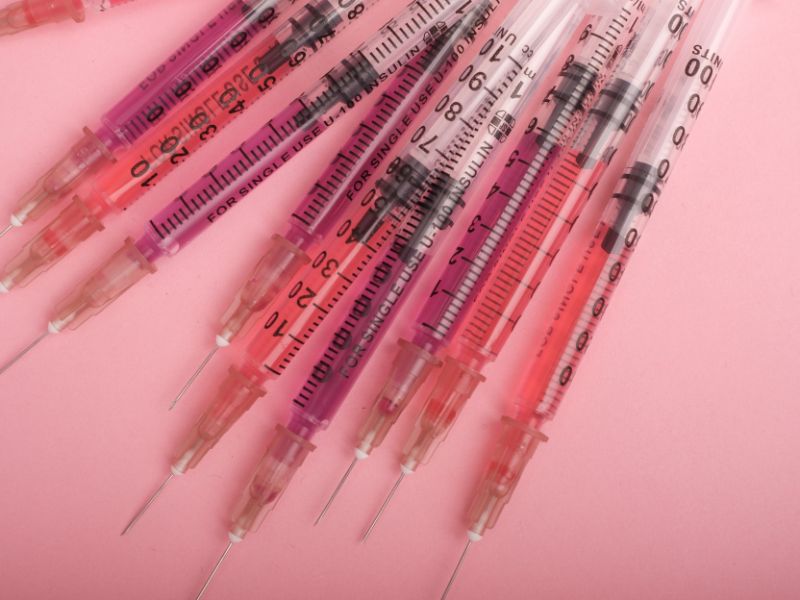Can a Food Sensitivity Make You Fat?
Can a food sensitivity make you fat? Unfortunately, the short answer is yes. The longer answer has to do with the way a food sensitivity can affect your digestive system, the bacteria it contains, your immune system, and how it can even cause you to crave the foods to which you are intolerant!
This is a problem with so many of my patients that a food sensitivity test is part of my regular diagnostic testing protocol—especially for patients who are having trouble losing weight. I’ve seen patients lose significant amounts of weight just by cutting food allergens from their diet. I have also seen people lose 20 to 30 pounds, simply by balancing the gut microbiome (the bacterial ecosystem in your intestinal system).
Many patients assume they aren’t “allergic” (or sensitive) to these foods because they don’t experience the immediate histamine reaction you might associate with an allergy. Hives, swelling, vomiting and more can result from a serious food allergy. Food sensitivities are less immediately noticeable. They often cause delayed symptoms. In some cases you may not even feel badly for up to 36 hours after eating a reactive food. You might even assume that your skin issues, headaches, fatigue, joint pain, and yes, weight gain are totally unrelated problems.
Food Sensitivities and Inflammation
When we eat foods that interfere with our body’s chemistry, we become inflamed. Our tissues swell, our bellies become bloated, and our face looks puffy. Sometimes this swelling alone makes us look 10-15 lbs heavier than we actually are.
We hear a lot about dairy, wheat (gluten), corn, sugar, soy, eggs, and peanuts (highly reactive foods). But, virtually any food—even “healthy” foods like oranges and flax seeds—can cause these reactions in certain individuals. If a person with food sensitivities eats the foods she is sensitive to on a daily basis, she could experience a near-constant state of bloating, fluid retention, and further weight gain.
This is due to the inflammation caused by a food sensitivity. When we eat reactive foods, they are not completely digested as they move through our body. This causes indigestion and gas, but it can also produce an inflammatory response in the body. Our immune system goes on the defense to protect us from these foods that present themselves as enemies in our body. When this happens, all sorts of substances are released. Inflammatory cytokines, chemicals like adrenaline and histamine, and even endorphins. Oddly (or maybe even cruelly) enough, this fluctuation in endorphins can actually cause your body to crave the foods to which we are sensitive.
The chemical reactions that take place when we eat certain reactive foods can contribute to bloating, inflammation, hormone imbalance, arthritis, back pain, skin issues, weight gain, among a host of other symptoms. This is why we, at Tringali Vibrant Health, take a functional approach to your wellness. I have developed extremely effective treatments for weight loss that are based on the understanding of the ways in which all of the body’s systems work in unison. The gut, the immune system, the detoxification system, your hormones and more are all connected.
This Inflammation Begins in Your Gut
The partially digested food particles that leak into your bloodstream do so through the lining of your gut. This is where the immune system reacts to the toxins and foods, producing a firestorm of inflammation. Your body then produces cortisol to control this inflammation. However, cortisol also raises your blood sugar. If we are eating reactive foods that increase inflammation, our body will produce more cortisol. Too much cortisol in the body can result in an insulin resistance (which puts you at risk for diabetes and causes fat to accumulate around your midsection). Insulin is a fat-storage, disease- and aging-promoting hormone.
Thus, an unhealthy gut makes us fat and sick. It causes our liver to become toxic, can give us an insulin-resistance, and keeping with the topic, can make us very fat. Healing the gut is pivotal for good health. Probiotics are key in the restoration of our gut lining that has been compromised by food sensitivities. They are just as important as finding out which sensitivities we have.
New research shows that fasting can impact the microbiome!
Find Out Which Food Sensitivities Are Making You Fat
One of the best ways to determine if food sensitivities are making you fat is to test to see which foods you are sensitive to. The second is to undergo an elimination diet. Remove common reactive foods like dairy, wheat (gluten), corn, sugar, soy, eggs, and peanuts for a minimum of three weeks. After the three weeks (or more), begin reintroducing these foods one at a time. Your reaction to these foods will be more present, as your body will not be used to them.
Finding out the food culprits that are causing your weight gain and other symptoms is one of the best ways to achieve optimal, vibrant health.
The Top Two Ways to Keep
Food Sensitivities From Making You Fat:
1.Book A Food Sensitivity Test & Consultation
Julie Vargas, APRN, FNP-BC is a Board-Certified Nurse Practitioner who specializes in Food Allergy/Sensitivity testing and nutritional protocols.
Consultations with Julie are 45 minutes long and will discuss:
- the results of your Infinite Food Allergy test
- guidance on how to eliminate foods, substitutions
- a 28-day elimination diet for optimal gut health, improved energy levels, healthy digestion, joint comfort, and an overall sense of wellness.
Book Today: 561-283-1166
2. Restore Good Gut Bacteria with Probiotics
Take probiotics daily to boost the healthy bacteria in your gut. Choose from pharmaceutical-grade brands, like our Vibrant Spore IG with spore-based technology.
We are empowered to help our bodies achieve vibrant health. Determining our food sensitivities, reducing inflammation, and healing our gut is where we begin.
If you have any questions, comments, or concerns please feel free to email us at info@tringali-health.com or call us at 561-283-1166.
Elizabeth Tringali, PA-C









